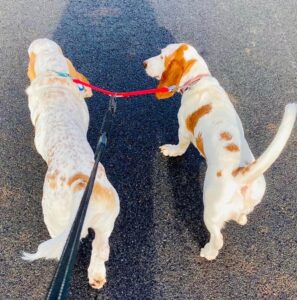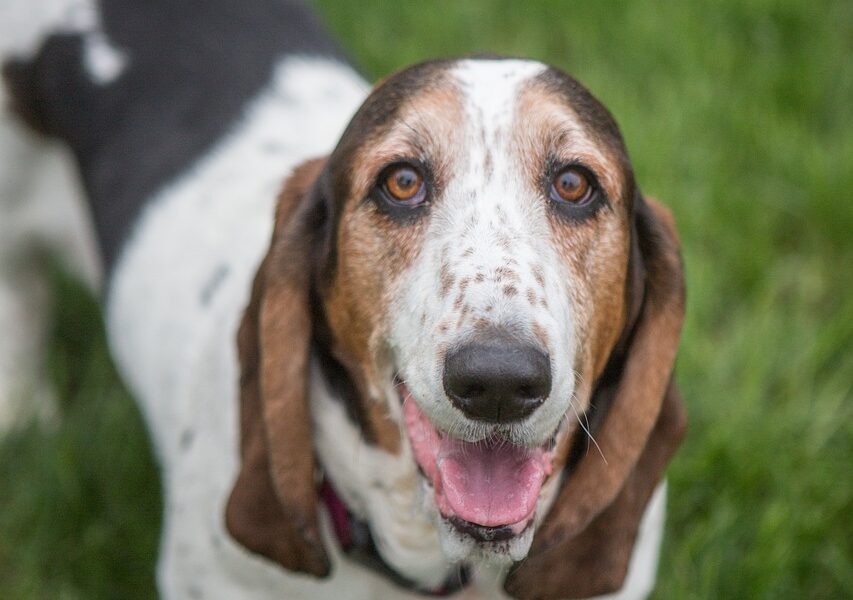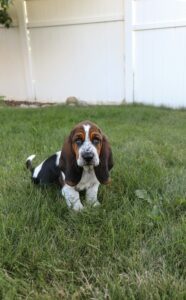Basset Hounds are known for their droopy ears, short legs, and friendly personalities. But what most people don’t know is that Bassets are heavy barkers. However, don’t be disappointed because there are some things that you can do to manage a vocal Basset Hound.
Do Basset Hounds Bark a Lot?

Basset Hounds bark a lot. In fact, Basset Hounds bark when they are territorial, excited, frustrated, or simply because they are bored. Basically, every emotion that the basset is having at the moment will be followed by a baying-like bark.
Basset Hounds are certainly not known for being silent. Basset Hounds have a tendency to be territorial. So, if they hear something they’re unfamiliar with near their house, they will bark more than normal. Even though they are not great at protecting you from intruders, a Basset will notify you by barking when something is off.
Basset Hounds are known for their deep, pleading barks and howling. These characteristics are primarily due to the breed’s long ears, extended muzzle, and deep chest cavity which gives them an exceptionally loud and distinct bark.
While Basset Hounds love being around people and being part of a family environment. They are naturally social dogs and require ample stimulation and companionship to help them stay fit both mentally and physically.
As such, they may take turns communicating vocally with other dogs nearby as well as members of their own family. Because of their breeds’ physical characteristics, such sounds become particularly intense due to a combination of the breed’s natural propensity for barking as well as their individual personality quirks.
Thus, it is important for owners to familiarize themselves with training techniques that will help create positive behaviors in order to control unnecessary barking.
Why Does My Basset Hound Bark So Much?
Basset Hounds bark as a way to get your attention, when they are excited about something, when they are scared or anxious, playing, or just trying to tell you something. Read on as I go into detail about why Basset Hounds bark so much.
1. The basset is trying to get your attention

Basset Hounds are renowned for their melodic baying, but why do they bark? Before anything else, it’s important to note that Bassets have been bred from generations of hunting dogs, so barking is an ingrained instinct.
However, often times our canine friends are barking to get the attention of another creature or person. When owners come home, you can bet there will be some exuberant yelps coming from the pup’s direction. A Basset will generally bark when someone unfamiliar walks in their vicinity or near to their yard territory in order to alert the owner of a possible intruder.
2. They are excited about something

Basset Hounds are amazingly expressive creatures, and one of their most common forms of expression is barking. When a Basset barks out of excitement, it’s their way of expressing their emotions. Dogs bark when they are happy to show joy, when they want something, such as food or to go outside, when they sense danger, or just because they love being around people and animals. It’s a natural behavior for dogs to express a range of emotions from excitement to alerting others.
Recognizing different types of barking can give pet owners an insight into the emotions of their furry friends and better understand what triggers dogs’ excited barks.
3. They are scared or anxious

Basset Hounds bark when they are scared as a form of self-expression. Their barks can be loud and frequent, but also convey feelings of fear or distress. It is important to understand that, while the bark may sound aggressive or intimidating, it is actually an attempt by the Basset to communicate its anxiety to the situation.
This can help alert both canine companions and humans in the near vicinity to their distress, allowing them time to respond in kind appropriately. A dog’s bark-related fears may be rooted in past trauma, such as abandonment or being startled by a loud noise. So, it is important for owners to pay close attention when their pup expresses itself through vocalization.
This way they can gain a better understanding of what could have triggered an outburst and help keep their companion safe.
4. They are playing

Bassets bark when they are playing because they are happy and excited. It is their way of communicating with other dogs and with their owners. Dogs bark when they are playing because they want to let everyone know that they are having a good time.
5. They are telling you they need something

When Bassets bark, it is often because they are trying to tell you that they need something. The Basset may need to go outside to relieve themselves, or they may be hungry and want you to feed them. This type of bark may be accompanied by a whine.
How Do I Get My Basset To Stop Barking?
Barking is a motor reflex that dogs use to communicate with the world around them. Generally speaking, barking serves two major purposes: alarm or warning, or expressing joy. But this is when Basset barking comes in. Bassets will bark basically when they are happy, sad, bored, excited, anxious, depressed, hungry, or tired. While there is no way to stop a Basset from barking, here is what you can do to minimize it.
1. Start with basic obedience commands such as sit, stay, come, and down

Taking the time to teach your Basset basic obedience commands is an effective way to stop excessive barking. Begin with simple commands like “sit” and “stay”. Be consistent, demonstrate the command each time you give it. Then, reward your dog’s learned behavior with a treat or petting.
It may take some effort and patience until your pup understands what behavior is expected of him. But, the result will be worth it when he realizes you are in control of his behavior. With consistency, you can put an end to disruptive barking and have a better-behaved pooch.
2. If the reason for barking is attention, provide positive reinforcement when they are quiet

Keeping a Basset quiet can be challenging, even for the most experienced pet owners. Luckily, there are simpler solutions to keeping dogs calm than yelling or punishing them. Positive reinforcement is an effective technique that uses rewards to train your pup not to bark excessively.
By providing the pup with treats or verbal praise when they remain quiet after being stimulated, you are encouraging them to continue being peaceful and calm. This simple strategy can improve their behavior in no time, making both you and your Basset happier!
3. Make sure your Basset gets plenty of exercise and playtime

If you’re trying to teach your pup not to Basset so often throughout the day, it’s important to make sure they get plenty of exercise. Maybe take them for a walk or a run in the morning and evening, and throw the ball with them in between meal times. Not only will this help keep them calm by releasing energy, but it will help them learn discipline as well.
For example, if you give your Basset a structured walk around the neighborhood with definite stops and turns, they learn obedience while being distracted from other barking triggers such as passers-by or other animals. An exercised dog is not only physically healthy; it is also learned and obedient.
4. Teach your Basset the ”quiet” command

Teaching your Basset the command to be quiet can be one of the most effective ways of stopping them from barking. Basset Hounds are very intelligent animals and they may even surprise you with how quickly they are able to pick up commands like this. By using positive reinforcement training methods, such as providing treats, you can encourage your pup to stop barking when given the silent cue of “Quiet”.
As an added layer of protection, it is a good idea to also teach your canine companion to redirect their energy away from barking when feeling anxious or excited by giving them an appropriate activity such as fetching a toy. With consistent practice and rewards, you should soon have a pup that is well-behaved and happy not to bark unnecessarily!
5. Ignore the barking (give no attention)

If you have a Basset that barks too much and it’s becoming a nuisance, one strategy to try is to simply ignore the barking. Your dog might bark as a way to get your attention from you. When they are not rewarded with interaction or attention, your pup will eventually learn that barking does not get them anywhere. They will stop the barking in order to find something else that works better.
It may be hard at first but remain consistent with ignoring the barking. Your pup will soon understand the desired behavior and stop its loud outbursts.
6. Seek professional help if the problem persists
Taking a Basset barking problem into your own hands can be incredibly difficult and stressful. Not only do you have to figure out the best technique for your specific dog, but oftentimes it can take longer than anticipated to see any tangible results.
Fortunately, there are experts who are trained in animal behavior that can help put an end to excessive barking much quicker than we could ever do on our own. When all else fails, or if you’re feeling lost and confused, it’s best to turn to a professional. They will be able to observe the situation from an unbiased perspective and offer specific advice tailored to reduce your Basset’s barking.








